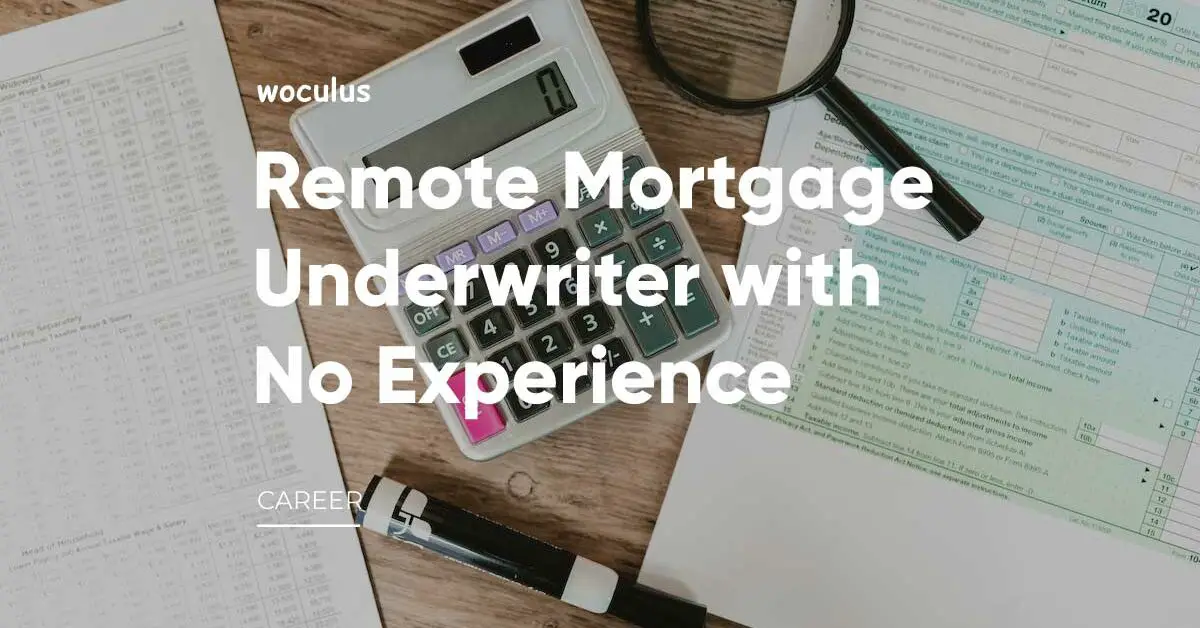Even if you have no prior experience in the mortgage industry, becoming a remote mortgage underwriter is a viable option. With the rise of remote work, many companies are now offering opportunities for individuals to work from home as mortgage underwriters. Not only does this career offer flexibility and the ability to work from anywhere, but it also provides job security as the housing market continues to thrive.
In this blog post, we will walk you through the steps to becoming a remote mortgage underwriter without experience. From understanding the role of a mortgage underwriter to obtaining the necessary certifications, we will provide you with all the information you need to kickstart your career in this exciting and rewarding field. So, whether you are a recent graduate or looking to make a career change, read on to discover how you can become a remote mortgage underwriter with no experience!
What Is a Remote Mortgage Underwriter?
Picture this: You’re a busy professional, running from meeting to meeting, barely finding the time to catch your breath. Yet, in the back of your mind, you’re also thinking about buying a new home. You’ve found your dream house, but now comes the daunting task of securing a mortgage. That’s where a remote mortgage underwriter comes in.
A remote mortgage underwriter is like a detective, sleuthing through financial records to ensure everything adds up. They’re the gatekeepers of the mortgage process, ensuring that borrowers are creditworthy and that the lender’s risk is minimized. They’re the ones who pore over all the documents – tax returns, bank statements, employment records – to make sure that everything is in order.
But what makes a remote mortgage underwriter different from a traditional underwriter? The answer is simple: they do it all from the comfort of their own home (or anywhere with a solid internet connection). No more sitting in a cramped office, surrounded by stacks of paperwork. Remote underwriters can access all the necessary information with just a few clicks of a button.
Not only does this make the underwriting process faster and more efficient, but it also opens up new opportunities for people who may not live near a physical underwriting office. Remote underwriters can work from anywhere in the world, which means lenders have a larger pool of talented underwriters to choose from.
So, whether you’re a busy professional, a stay-at-home parent, or anyone else in need of a mortgage, a remote mortgage underwriter is there to help. They’re the ones who make sure that your dream of homeownership becomes a reality.
How to Become a Remote Loan Signing Agent: Comprehensive Guide
How to Become a Remote Mortgage Underwriter with No Experience
While you may think having no prior experience would hinder your chances of breaking into the industry, rest assured that this is not the case. Many mortgage underwriters begin their careers with little to no experience and work their way up the ladder through hard work and dedication.
So, how can you become a remote mortgage underwriter with no experience? Here are some tips to get you started:
1. Get Educated
Are you ready to take your first step towards a successful career as a remote mortgage underwriter? Then it’s time to get educated!
While it’s true that formal education isn’t always necessary to become a mortgage underwriter, having a degree in finance, accounting, or a related field can be a major asset. A solid education provides a foundation of knowledge and skills that will set you apart from other candidates and give you the tools you need to succeed in the industry.
But even if you don’t have a degree, there are still plenty of ways to gain relevant education and skills. Consider taking courses or getting certifications in mortgage underwriting or finance. This can demonstrate your dedication to the field and show potential employers that you’re serious about your career.
By investing in education and continuing to learn throughout your career, you’ll not only become a better mortgage underwriter, but you’ll also position yourself for advancement opportunities and higher salaries. And with the flexibility of remote work, you can pursue your education while working from the comfort of your own home.
2. Gain Relevant Experience
So you are interested in becoming a remote mortgage underwriter but don’t have direct experience in the field? Fear not, because there are plenty of ways to gain relevant experience that can help you land your dream job.
One way to gain experience is by working in a related field, such as finance or banking. For example, you could work as a loan officer, credit analyst, or in customer service for a mortgage lender. These positions will provide you with a solid understanding of the mortgage industry and allow you to develop transferable skills that will be useful in your role as a mortgage underwriter.
Another option is to seek out internships or volunteer opportunities with mortgage lenders or banks. This will give you hands-on experience in the industry and allow you to network with professionals who can help you break into the field. Furthermore, if you’re currently working in a different industry but have transferable skills, highlight them on your resume and cover letter. For example, if you have experience analyzing financial statements or evaluating credit reports, these skills can be valuable in the mortgage underwriting process.
The Ultimate Guide to Becoming a Remote Closing Agent
3. Network
Networking is a critical component of any successful job search, and it’s especially important if you’re looking to break into a new industry like mortgage underwriting. By making connections with people in the industry, you can learn about job opportunities, get insider information, and even secure job offers through word-of-mouth referrals.
So, how can you start networking as a remote mortgage underwriter with no experience? Here are some tips:
- Use social media: LinkedIn is a great platform for networking with professionals in the industry. Join relevant groups, follow industry influencers, and engage with others in the field by commenting on posts and sharing your own insights.
- Attend virtual job fairs: Many job fairs and career events are now being held virtually, making it easier than ever to connect with recruiters and hiring managers. Be sure to come prepared with questions and an elevator pitch about yourself and your skills.
- Join professional organizations: There are a number of professional organizations for mortgage underwriters, such as the National Association of Mortgage Underwriters (NAMU). Joining these organizations can provide you with access to networking events, training opportunities, and industry news.
- Reach out to recruiters: Many mortgage lenders and banks work with recruiters to find qualified candidates for their underwriting positions. Reach out to recruiters on LinkedIn or through their company website to introduce yourself and express your interest in the industry.
4. Practice Your Skills
One of the best ways to set yourself apart from other candidates and increase your chances of landing a job as a remote mortgage underwriter is by showcasing your skills and expertise through a strong resume and cover letter.
Your resume should highlight your relevant education, skills, and experience. Be sure to emphasize any coursework or certifications you have in mortgage underwriting, as well as any transferable skills from previous work experience. Use specific examples to demonstrate your expertise, such as successful loans you’ve underwritten or any accomplishments in a related field.
Finally, don’t be afraid to reach out to recruiters or hiring managers directly. While job postings may not always explicitly state that remote candidates are welcome, you may be surprised by how many companies are open to remote work arrangements. By showing your enthusiasm and passion for the industry, you may be able to convince a company to take a chance on a talented and motivated remote mortgage underwriter.
5. Be Persistent
Persistence is the key to success in any job search, and breaking into the mortgage underwriting industry is no exception. While it can be a challenging and competitive field to enter, it’s important to stay positive and keep pushing forward.
One way to stay motivated is by setting realistic goals and tracking your progress. Make a list of companies you’d like to work for and the skills or experience you need to improve on. Then, set achievable milestones and celebrate your achievements along the way.
Another important factor in persistence is being open to feedback and continuously improving your skills. Consider taking online courses, attending industry conferences or workshops, or seeking out mentorship opportunities to help you stay up-to-date with the latest trends and best practices in the field.
Finally, surround yourself with a supportive network of friends, family, and industry professionals. Join online forums or networking groups to connect with others in the field and learn from their experiences.
What Salary Scale Can You Expect as A Remote Mortgage Underwriter?
As of May 6, 2023, the typical yearly compensation for a Remote Mortgage Underwriter in the US is $95,790. This is roughly equivalent to an hourly rate of $46.05, a weekly rate of $1,842, or a monthly rate of $7,982. It’s worth noting that there is a significant range in pay for this position, with salaries ranging from $61,000 to $121,500 per year. This suggests that there may be room for career advancement and higher pay based on factors such as skill level, location, and experience.
Tools You Might Need to Familiarize Yourself With
Congratulations on embarking on a new career journey as a remote mortgage underwriter! As you dive into this exciting new role, there are a few tools that you should familiarize yourself with to ensure your success.
First and foremost, you’ll need to have a solid understanding of mortgage underwriting software. This software is essential for organizing and analyzing borrower financial data, as well as determining the risk associated with each loan application. By mastering this tool, you’ll be able to efficiently and accurately process loan applications from the comfort of your own home.
Another tool that you’ll need to become familiar with is electronic document management software. As a remote mortgage underwriter, you’ll need to be able to quickly and easily access a wide variety of documents related to each loan application. With electronic document management software, you can securely store, organize, and retrieve these documents at the click of a button.
In addition to these software tools, you’ll also want to become proficient in online communication and collaboration tools. As a remote worker, you’ll need to be able to communicate with team members, borrowers, and other stakeholders via email, video conferencing, and other online platforms. By mastering these tools, you’ll be able to effectively collaborate with your team and keep the loan application process moving forward.
Finally, it’s important to develop strong time management and organizational skills. Working remotely requires discipline and focus, so you’ll need to be able to prioritize your workload and manage your time effectively. With the right tools and skills in place, you’ll be well on your way to a successful career as a remote mortgage underwriter.
Some FAQ About Remote Mortgage Underwriter With No Experience
Q: What Skills Are Required to Become a Remote Mortgage Underwriter?
A: The skills required to become a remote mortgage underwriter include strong analytical and critical thinking skills, attention to detail, excellent communication skills, and proficiency in using relevant software and technology. Knowledge of mortgage lending guidelines and regulations is also important.
Q: What Are Some Common Challenges Faced by Remote Mortgage Underwriters?
A: Some common challenges faced by remote mortgage underwriters include managing their workload effectively, staying up to date with changing regulations and guidelines, and maintaining strong communication with colleagues and clients while working remotely.
Q: What Are Some Best Practices for Remote Mortgage Underwriters?
A: Some best practices for remote mortgage underwriters include setting up a dedicated workspace, establishing a regular work schedule, staying organized and focused, maintaining regular communication with colleagues and clients, and prioritizing self-care to prevent burnout.
Conclusion
Becoming a remote mortgage underwriter with no prior experience may seem daunting, but it’s not impossible. With the right mindset, dedication, and willingness to learn, you can embark on a rewarding career in this growing industry.
Start by researching the requirements for becoming a mortgage underwriter, including the necessary certifications and qualifications. Consider enrolling in online courses, attending industry events, and networking with professionals in the field.
Remember to highlight your transferable skills and experience, even if they don’t directly relate to mortgage underwriting. Emphasize your attention to detail, ability to analyze data, and excellent communication skills.
Finally, don’t be discouraged if you face rejection or setbacks. Keep honing your skills, seeking feedback, and refining your approach. With persistence and hard work, you can carve out a successful career as a remote mortgage underwriter.






